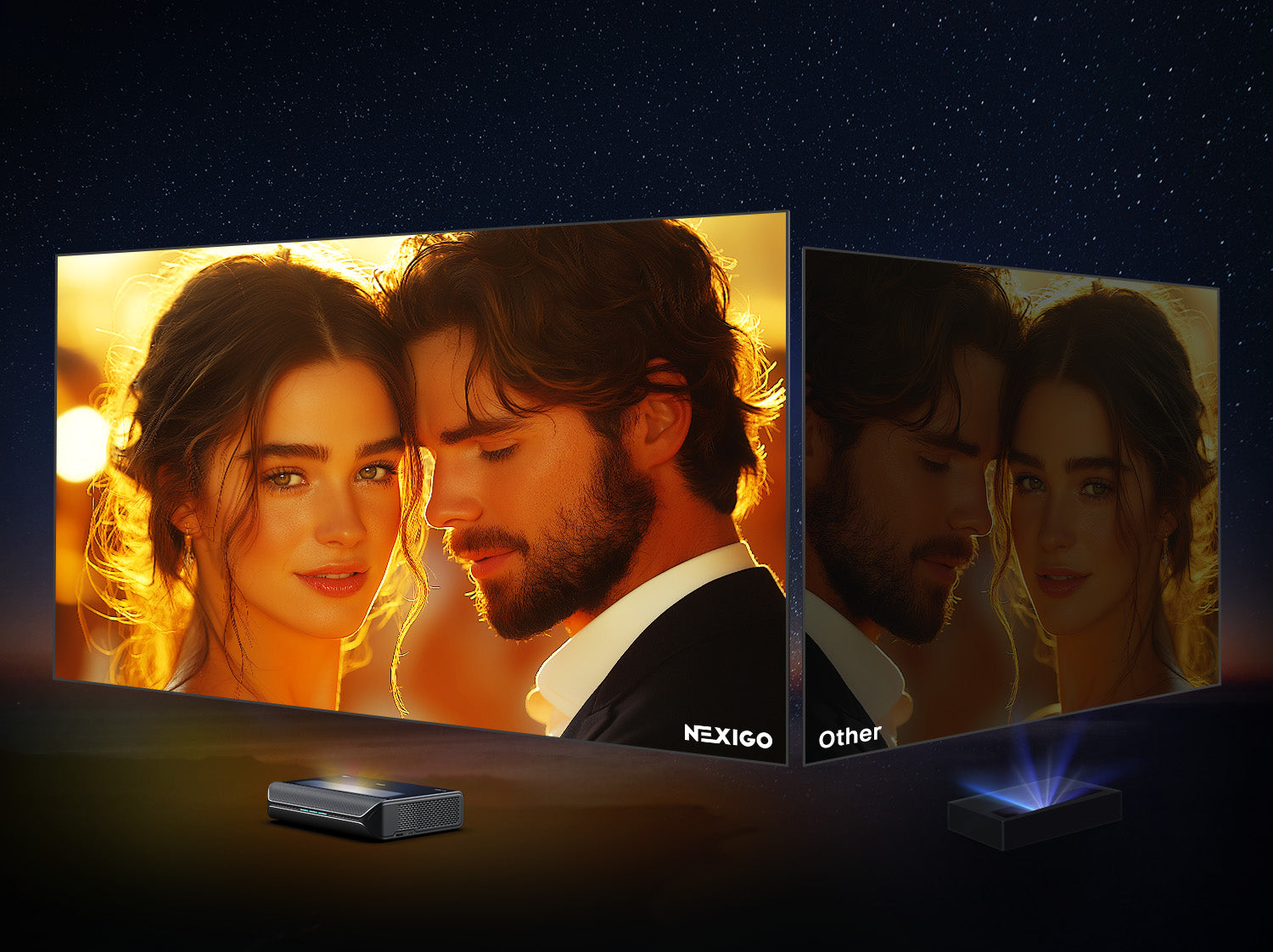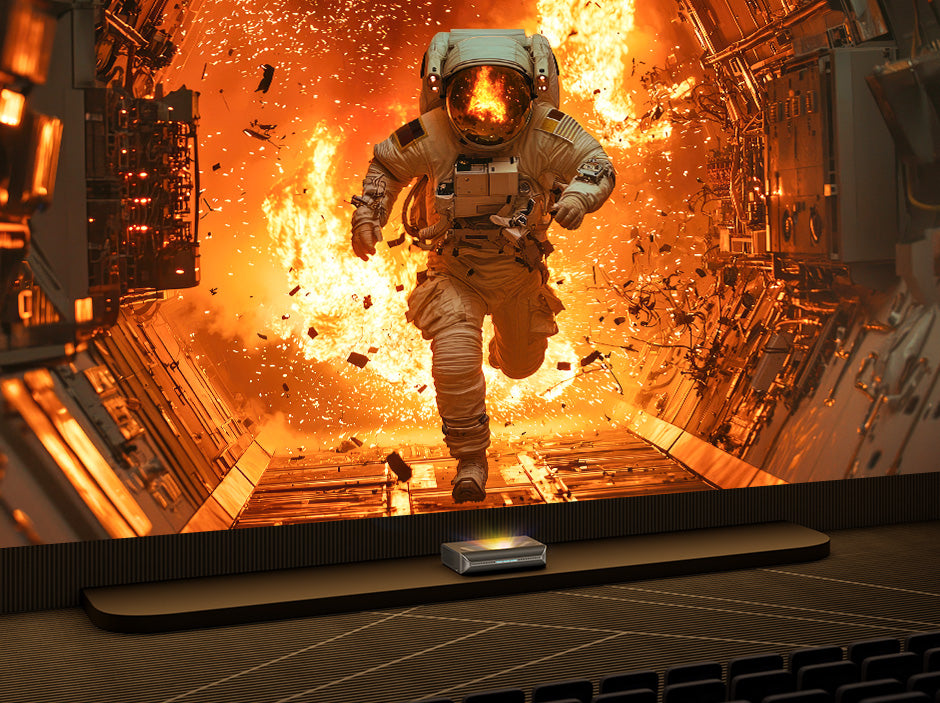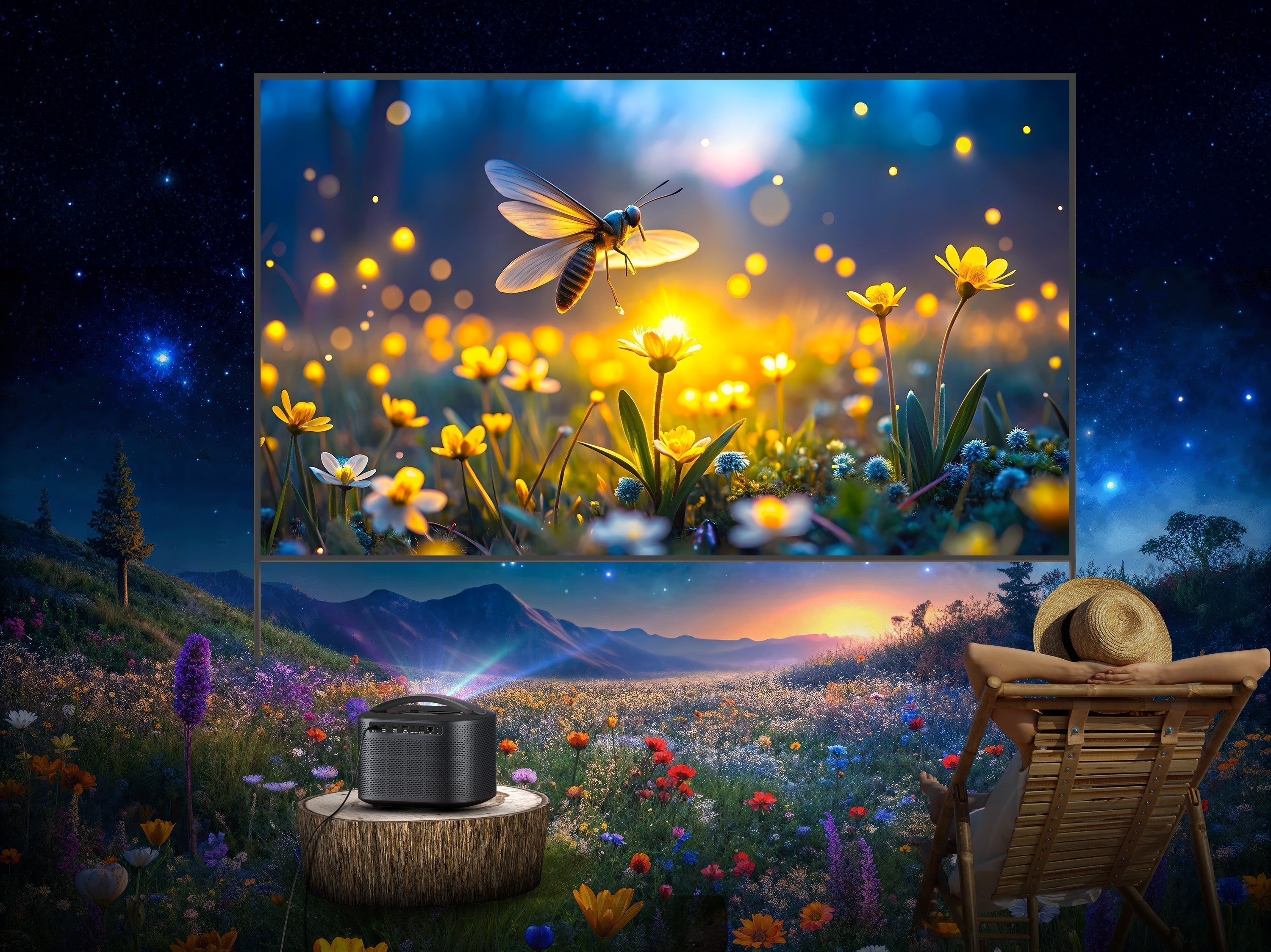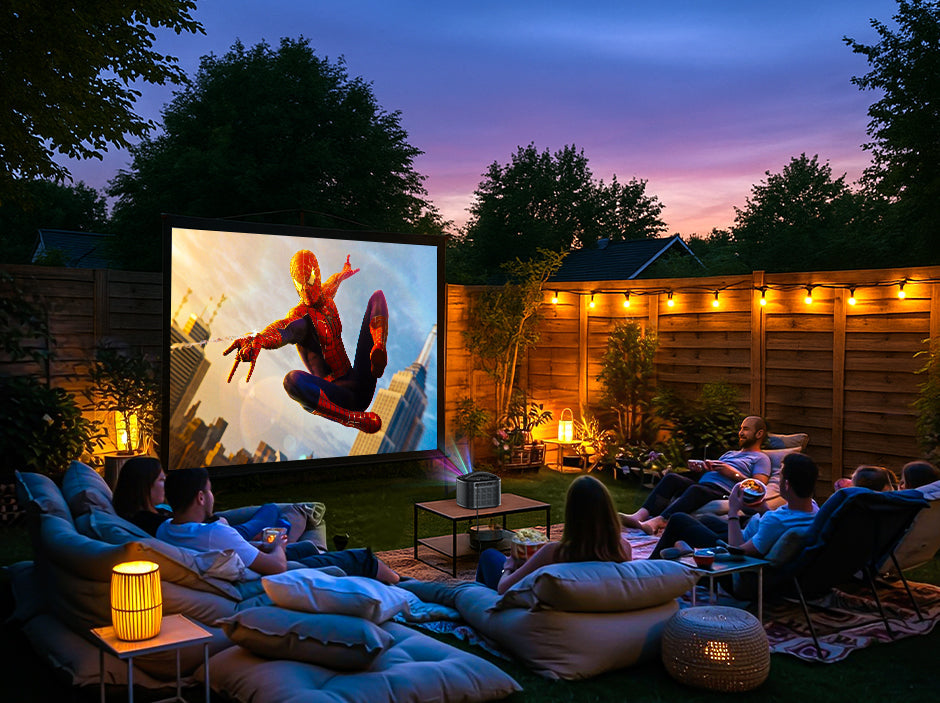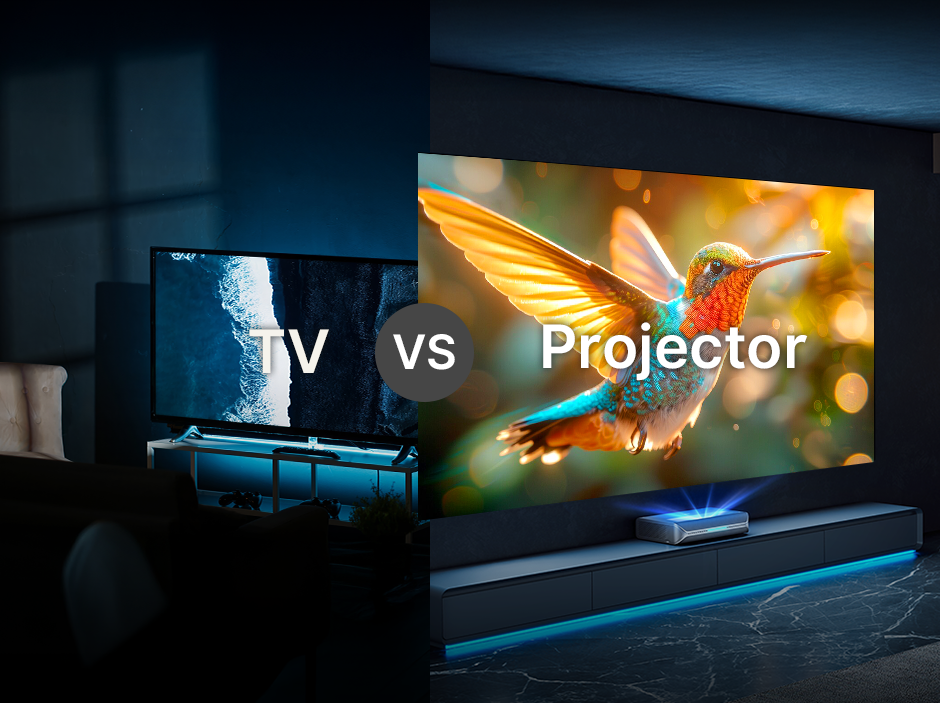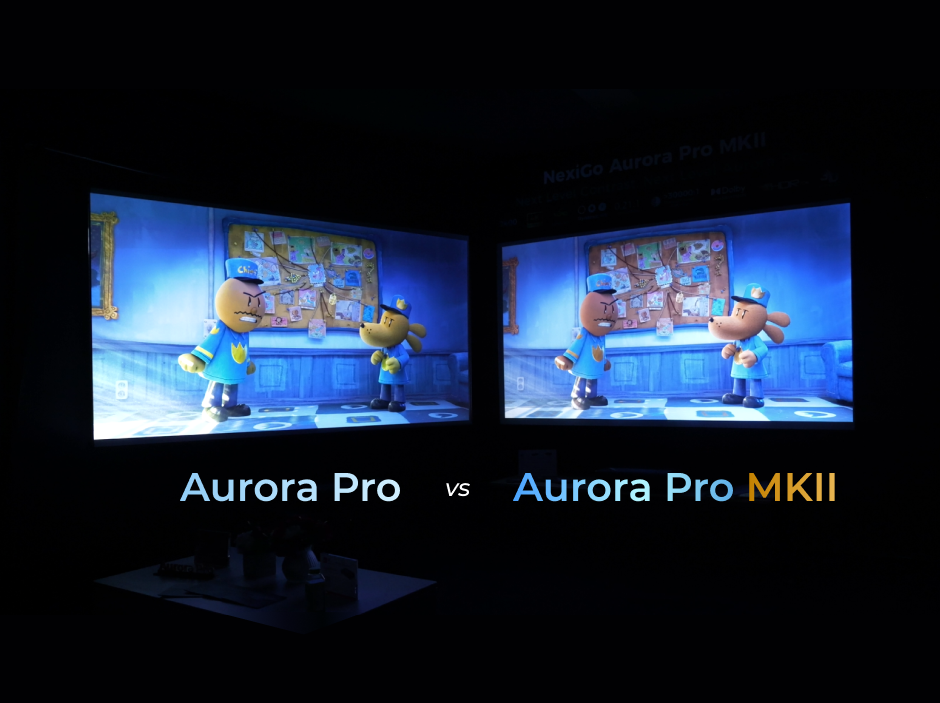Article Overview
1. Input Lag and Refresh Rate2. Screen Size3. Visual Performance4. Throw Ratio5. Audio PerformanceRecommended Projectors by NexiGo
Anniversary Deal
Ends at July 18

TriVision Ultra
4K Tri-LED-Laser Projector with Dolby Vision & HDR10+
$1299.99 $1899.99
Learn More
Best Gaming Projectors for 2025: How to Choose + Top Picks for Every Budget
NexiGo | July 1, 2025
As the world of gaming evolves, so do the ways we experience it. While monitors and TVs have long dominated the gaming landscape, gaming projectors are rising in popularity, and for good reason. Projectors offer massive screen sizes, immersive visuals, and competitive specs that traditional displays can’t replicate.
Whether you're a hardcore PS5 player, an Xbox Series X enthusiast, or a casual Nintendo Switch gamer, choosing the right projector can dramatically elevate your gaming experience.
In this guide, we’ll walk you through the key features to look for in a gaming projector and introduce our top picks for 2025.
1. Input Lag and Refresh Rate: The Core of Responsive Gaming
🔄 Input Lag: Precision Matters
When it comes to real-time reaction in gaming, low input lag is critical. Input lag measures the time between when you press a button on your controller and when your character moves onscreen. In fast-paced games like Fortnite, Call of Duty, or Street Fighter, even a delay of 30 milliseconds can be the difference between victory and defeat.
- 50 ms and above is very noticeable, significantly impacting your gameplay
- 40 ms and below is acceptable for most gamers
- <20 ms is required for competitive gamers who need maximum responsiveness
- Best-in-class gaming projectors offer input lag as low as 4.2ms, ensuring near-instant response
Imagine that you’re dueling in a chaotic boss fight in Elden Ring. You need your character’s every roll, parry, or spell to register the moment you act. That’s the kind of precision a low-lag gaming projector provides.
🚀 Refresh Rate: Smoother Motion, Sharper Action
Refresh rate refers to how many frames your projector can display per second, measured in Hertz (Hz). Projectors with low refresh rates may cause screen tearing or motion blur, which disrupts immersion and can affect performance.
Movies generally play at 24 Hz, but games require a higher refresh rate to feel smooth and fluid. For years, 60 Hz was the gold standard, but with the latest projector technology, you can enjoy 120Hz or even 240Hz. These next-gen refresh-rates are so responsive that they can give you a competitive edge in high-speed gameplay.
However, the processing power required for these higher refresh rates affects the maximum resolution. That’s why you should pay attention to Display timing, which is the combination of refresh rate and resolution. This determines the overall experience of gameplay, and what you get out of it.
- 1080p at 240 Hz is ultra smooth and responsive, ideal for fast-paced games
- 1440p at 120 Hz is balanced for high clarity and smooth motion
- 4K at 60 or 120 Hz is visually stunning for immersive single-player experiences
The best gaming projectors maintain this balance, allowing players to enjoy both visual fidelity and competitive performance.
2. Screen Size: A Bigger, More Immersive Vie
Gaming projectors break free from the fixed screen sizes of TVs and monitors. While standard displays generally cap out at 85 inches, projectors can expand up to 150 inches or more, transforming your wall into a gaming arena.
This is perfect for open-world games like Red Dead Redemption 2, where having a life-size display will significantly enhance your immersion in the world.
It’s also great for split-screen multiplayer games, since each person in a 4-player game will essentially get their own 75” screen. Plus, projectors can be ceiling-mounted or stored away, making them ideal for shared or compact spaces.
3. Visual Performance: Crystal-Clear Detail and Cinematic Color
🖼️ Resolution: Sharpness That Pulls You In
A projector’s resolution determines how detailed and lifelike your games appear.
- 1080p (Full HD) is ideal for smaller setups and casual gamers
- 4K UHD delivers exceptional image clarity and detail, making it ideal for larger screens and next-gen titles
In open-world games like Red Dead Redemption 2 or Assassin’s Creed Mirage, the increased pixel density of 4K enables you to see distant mountains, intricate textures, and facial animations in more detail.
🎨 Color Gamut and Color Accuracy: Bringing Games to Life
Beyond resolution, color performance is critical for visual immersion. A gaming projector with a wide color gamut, such as Rec.709, DCI-P3, or even BT.2020, can display a broader spectrum of colors. Look for this feature if you want richer reds, deeper blues, and more natural skin tones.
Color accuracy is also important. It’s measured in Delta-E (ΔE), which is a measure of the difference between the color in a video game and the color visible on-screen. The lower this measurement, the more accurate the colors are to the gamemaker’s intent. Look for projectors with Delta- E < 3 for color differences that are virtually imperceptible to the human eye.
For gamers who appreciate cinematic quality, this level of color precision makes every moment feel more authentic.
🌈 HDR Support: Depth and Drama in Every Scene
High Dynamic Range (HDR) enhances gaming visuals by increasing contrast, improving brightness gradation, and expanding color depth. A projector with robust HDR support delivers more lifelike and emotionally resonant gameplay.
Here's a breakdown of the major HDR formats you may encounter in gaming projectors:
- Dolby Vision: The most advanced HDR format, Dolby Vision uses dynamic metadata to optimize brightness, contrast, and color frame by frame. It delivers ultra-deep blacks, vivid highlights, and incredibly rich colors. Supported on select Xbox titles and premium projectors. It’s best for gamers who prioritize top-tier image quality and cinematic visuals.
- HDR10+: Like Dolby Vision, HDR10+ uses dynamic metadata to adjust contrast and brightness scene by scene, but it's an open standard with broader compatibility. It offers improved shadow detail and highlight control over traditional HDR10. It’s a cost-effective choice for gamers who want dynamic contrast with excellent visual clarity.
- HDR10: The most common HDR format, HDR10 supports 10-bit color depth and static metadata. While it doesn't adapt per scene, it still provides a significant upgrade over SDR with brighter highlights and richer colors. It’s considered a reliable standard for general HDR gaming across all major consoles.
For games that feature rich color environments and cinematic lighting (such as Cyberpunk 2077, Hogwarts Legacy, or Red Dead Redemption 2), Dolby Vision or HDR10+ will deliver the best results. For titles with less demanding color accuracy, or for general HDR use, HDR10 is a solid choice.
💡 Brightness: Visibility in Any Lighting
Gaming doesn’t always happen in a pitch-dark room. Choose your brightness level based on your gaming space and habits:
- 2,000–2,900 ANSI Lumens: Best for controlled lighting environments or evening sessions
- 3,000–4,000+ ANSI Lumens: Ideal for daytime gaming or mixed-use rooms with ambient light
For the best experience, pair a bright projector with an ALR (Ambient Light Rejecting) screen to preserve vivid colors and contrast, even in challenging lighting conditions.
🌓 Native Contrast Ratio: Shadow Detail that Matters
Contrast ratio affects how well your projector renders the difference between light and dark areas. A high native contrast ratio is essential for visual storytelling, especially in games with dynamic lighting or stealth gameplay.
Imagine you're creeping through the shadows of Hogwarts’ Forbidden Forest. A projector with a high contrast ratio will reveal subtle movements, environmental textures, and enemies hidden in darkness, without crushing black levels or overexposing highlights.
4. Throw Ratio: Project the Right Size in Your Space
📐 Understanding Throw Distance
Throw ratio determines how far the projector must be from the wall or screen to produce your desired image size.
- Standard throw projectors: 8+ ft for a 100” image
- Short throw projectors: 4–6 ft for a 100” image
- Ultra-short throw (UST): ~1 ft for a 100” image
Use a projector distance calculator to find the best placement for your setup.
5. Audio Performance: Built-in Sound That Resonates
High-quality audio is essential for immersive gaming, but not everyone has the space or budget for a full speaker setup. That’s where premium gaming projectors shine.
Many modern gaming projectors come with Dolby Audio speakers, delivering room-filling sound without external equipment. For competitive play, you can still plug in your headset or connect a soundbar via Bluetooth or HDMI ARC/eARC.
Top Gaming Projectors from NexiGo 2025
Aurora Pro MKII: Best UST Gaming Projector for PS5/Xbox

- Resolution: 4K UHD, Dolby Vision, HDR 10+
- Input Lag: 4.2 ~ 8 ms
- Brightness: 2,400 ANSI lumens
- Contrast Ratio: > 30,000:1 Contrast with SAE
- Color Gamut: 107% BT2020, Delta E≈1
- Throw: Ultra-Short Throw
- Refresh Rate: 1080p @ 240 Hz, 4K @ 60 Hz
- Audio: 2 x 15 W Woofers, 2 x 15 W Tweeters, Dolby Atmos
Why It Stands Out: Designed for high-end console gaming in modern living spaces, Aurora Pro MKII packs 4K clarity, fast input response, deeper contrast, and immersive sound into one elegant unit.
🎯 NexiGo PJ40 Gen3: Best Budget Gaming Projector

- Resolution: 1080p, 4K Supported, HDR10, D65 calibrated
- Input Lag: 16 ms
- Brightness: 800 ANSI lumens
- Contrast Ratio: 30,00:1 Native Contrast
- Audio: Powerful 20 W Speakers
- Display Size: Up to 300 Inches
Why It Stands Out: An affordable yet powerful option for gamers with limited space who still demand top-tier performance.
🎯 NexiGo TriVision Ultra – Best 4K Tri-LED-Laser Projector for Mixed Use

- Resolution: 4K UHD, Dolby Vision, HDR10+
- Input Lag: 4.2 ~ 8 ms
- Brightness: 2,600 ANSI lumens
- Color Gamut: 110% BT2020, Delta E<1
- Refresh Rate: 1080p @ 240 Hz, 4K @ 60Hz
- Auto Screen Adaptation: Autofocus, Auto Keystone Correction, Intelligent Obstacle Avoidance, Intelligent Eye Protection, Auto Screen Detection, Adaptive Brightness
- Audio: 30 W speakers with Dolby Audio and DTS Virtual: X
Why It Stands Out: Ideal for casual gaming and mixed-use media rooms with gorgeous 4K visuals and smart features.
Final Thoughts: The Ultimate Gaming Experience Awaits
The best projector for gaming isn’t just about screen size. It’s about how each feature supports your playstyle and environment. From lightning-fast response times to cinema-level visuals and audio, today’s gaming projectors can rival or surpass traditional displays in more ways than one.
By considering your console type, room size, brightness conditions, and gaming preferences, you’ll be able to find the perfect projector that enhances every moment of gameplay.
Article Overview
1. Input Lag and Refresh Rate2. Screen Size3. Visual Performance4. Throw Ratio5. Audio PerformanceRecommended Projectors by NexiGoPrime Day Special
Ends at July 18

Aurora Pro MKII
Next-Level 4K Tri-Color Laser Projector
$2699 $3499
NexiGo | July 1, 2025
As the world of gaming evolves, so do the ways we experience it. While monitors and TVs have long dominated the gaming landscape, gaming projectors are rising in popularity, and for good reason. Projectors offer massive screen sizes, immersive visuals, and competitive specs that traditional displays can’t replicate.
Whether you're a hardcore PS5 player, an Xbox Series X enthusiast, or a casual Nintendo Switch gamer, choosing the right projector can dramatically elevate your gaming experience.
In this guide, we’ll walk you through the key features to look for in a gaming projector and introduce our top picks for 2025.
Like what we do? Stay tuned for more.
Whether you work at home or in the office, NexiGo provides a wide range of quality and affordable technology to elevate your daily life. Our products encompass everything from webcams and portable monitors to projectors and gaming accessories.
Articles we think you'll love






